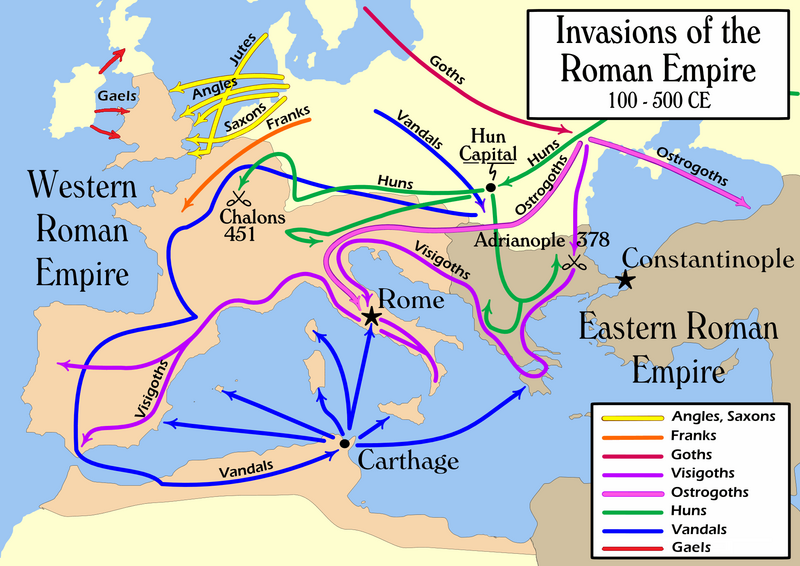
Migration and the formation of kingdoms (400–600)
There are records of Germanic infiltration into Britain that date before the collapse of the Roman Empire.[16] It is believed that the earliest Germanic visitors were eight cohorts of Batavians attached to the 14th Legion in the original invasion force underAulus Plautius in AD 43.[16][17][18] There is a hypothesis that some of the native tribes, identified as Britons by the Romans, may have been Germanic language speakers although most modern scholars disagree with this.[19][20]
It was quite common for Rome to swell its legions with foederati recruited from the German homelands.[21] This practice also extended to the army serving in Britain, and graves of these mercenaries, along with their families, can be identified in the Roman cemeteries of the period.[22] The migration continued with the departure of the Roman army, when Anglo-Saxons were recruited to defend Britain; and also during the period of the Anglo-Saxon first rebellion of 442.[23]
If the Anglo-Saxon Chronicle is to be believed, the various Anglo-Saxon kingdoms which eventually merged to become England were founded when small fleets of three or five ships of invaders arrived at various points around the coast of England to fight the Sub-Roman British, and conquered their lands.[24] As Margaret Gelling points out, in the context of place name evidence, what actually happened between the departure of the Romans and the coming of the Normans is the subject of much disagreement by historians.[25]

History of Anglo-Saxon England
n the history of Great Britain, Anglo-Saxon England refers to the historical land roughly corresponding to present-day England, as it existed from the 5th to the 11th century, but not including kingdom of Dumnonia (Devon and Cornwall collectively) until the 9th century.
The Anglo-Saxons were the members of Germanic-speaking groups who migrated to the southern half of the island from continental Europe, and their cultural descendants. Anglo-Saxon history thus begins during the period of Sub-Roman Britain following the end ofRoman control, and traces the establishment of Anglo-Saxon kingdoms in the 5th and 6th centuries (conventionally identified asseven main kingdoms: Northumbria, Mercia, East Anglia, Essex, Kent, Sussex, and Wessex), their Christianisation during the 7th century, the threat of Viking invasions and Danish settlers, the gradual unification of England under Wessex hegemony during the 9th and 10th centuries, and ending with the Norman conquest of England by William the Conqueror in 1066. Anglo-Saxon identity survived beyond the Norman Conquest,[1] and came to be known as Englishry under Norman rule and ultimately developed into the modern English people.
The arrival of the Anglo-Saxons into Britain can be seen in the context of a general movement of Germanic peoples around Europe between the years 300 and 700, known as the Migration period (also called the Barbarian Invasions or Völkerwanderung). In the same period there were migrations of Britons to the Armorican peninsula (Brittany and Normandy in modern-day France): initially around 383 during Roman rule, but also c. 460 and in the 540s and 550s; the 460s migration is thought to be a reaction to the fighting during the Anglo-Saxon mutiny between about 450 to 500, as was the migration to Britonia (modern day Galicia, in northwest Spain) at about the same time.[26] The historianPeter Hunter-Blair expounded what is now regarded as the traditional view of the Anglo-Saxon arrival in Britain.[27] He suggested a mass immigration, fighting and driving the Sub-Roman Britons off their land and into the western extremities of the islands, and into the Breton and Iberian peninsulas.[28] This view was probably influenced by sources such as Bede, where he talks about the Britons being slaughtered or going into "perpetual servitude".[29] According to Härke the more modern view is of co-existence between the British and the Anglo-Saxons.[30][31][32] He suggests that several modern archaeologists have now re-assessed the invasion model, they have developed a co-existence model largely based on the Laws of Ine. The laws include several clauses that provide six different wergild levels for the Britons, of which four are below that of freeman.[33] Although it was possible for the Britons to be rich freemen, in Anglo-Saxon society, generally it seems that they had a lower status than that of the Anglo-Saxons.
initial vigorous British resistance was led by a man called Ambrosius Aurelianus,[38] from which time victory fluctuated between the two nations. Gildas records a "final" victory of the Britons at the Battle of Mount Badon in c. 500, and this might mark a point at which Anglo-Saxon migration was temporarily stemmed.[15] Gildas said that this battle was "forty-four years and one month" after the arrival of the Saxons, and was also the year of his birth.[15] He said that a time of great prosperity followed.[15] But, despite the lull, the Anglo-Saxons took control of Sussex, Kent, East Anglia and part of Yorkshire; while the West Saxons founded a kingdom in Hampshire under the leadership of Cerdic, around 520.[39] However, it was to be 50 years before the Anglo-Saxons began further major advances.[39] In the intervening years the Britons exhausted themselves with civil war, internal disputes, and general unrest: which was the inspiration behind Gildas's book De Excidio Britanniae (The Ruin of Britain).[40]
The next major campaign against the Britons was in 577, led by Cealin, king of Wessex, whose campaigns succeeded in taking Cirencester, Gloucester and Bath (known as theBattle of Dyrham).[39][41][42] This expansion of Wessex ended abruptly when the Anglo-Saxons started fighting among themselves, and resulted in Cealin eventually having to retreat to his original territory. He was then replaced by Ceol (who was possibly his nephew): Cealin was killed the following year, but the annals do not specify by whom.[43][44]Cirencester subsequently became an Anglo-Saxon kingdom under the overlordship of the Mercians, rather than Wessex
No comments:
Post a Comment